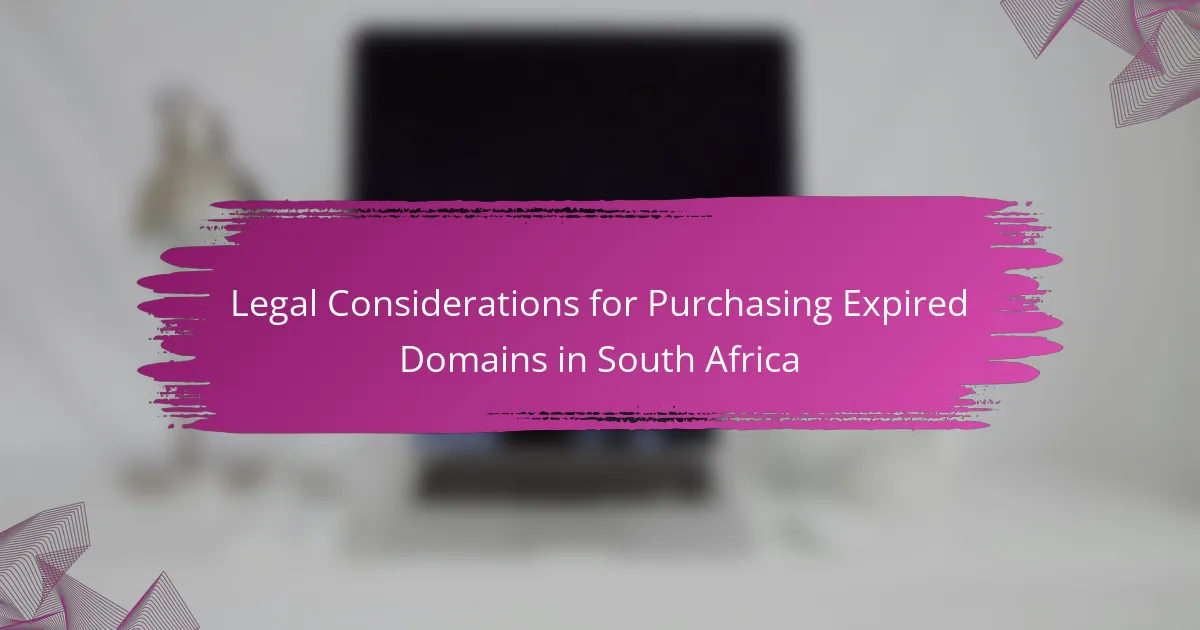Purchasing expired domains in South Africa involves navigating various legal considerations, including trademark issues and potential liabilities related to previous content. It is essential for buyers to conduct thorough research and understand the domain’s history to mitigate risks and ensure compliance with local regulations. Engaging legal experts can further safeguard against costly disputes and penalties associated with these acquisitions.
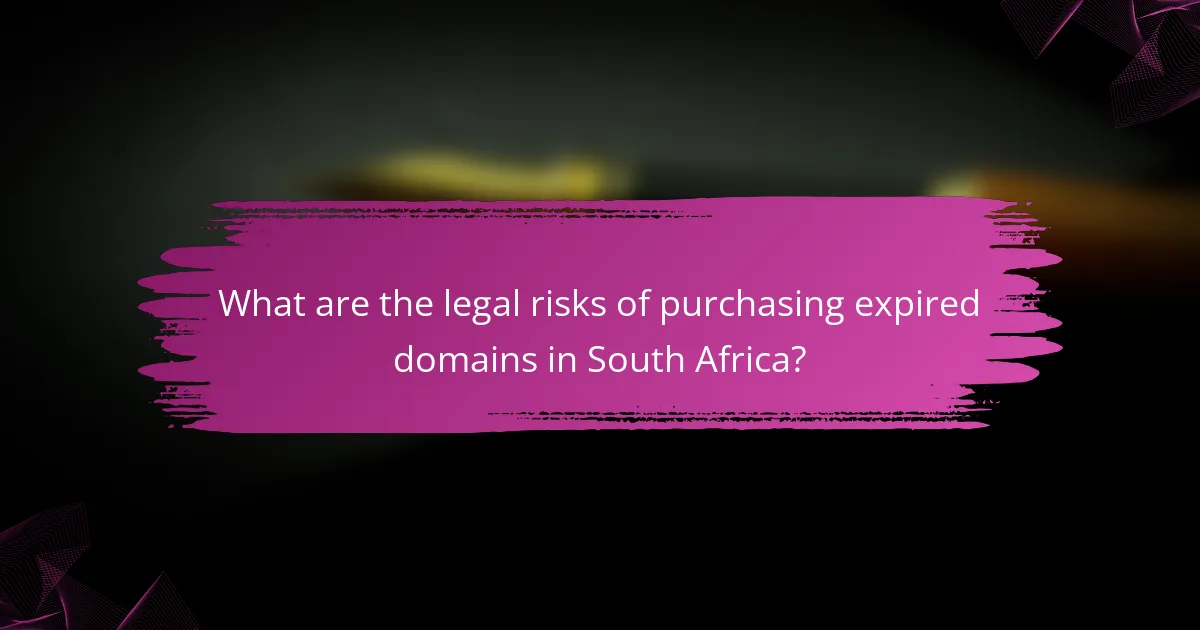
What are the legal risks of purchasing expired domains in South Africa?
Purchasing expired domains in South Africa carries several legal risks, including potential trademark issues, liability for past content, and possible SEO penalties. Understanding these risks is crucial for anyone considering such acquisitions to avoid costly legal disputes and ensure compliance with local regulations.
Potential trademark infringements
When acquiring an expired domain, one significant risk is the possibility of infringing on existing trademarks. If the domain name closely resembles a registered trademark, the original owner may claim that your use of the domain causes confusion among consumers. This could lead to legal action, including demands for the domain’s return or financial compensation.
To mitigate this risk, conduct thorough trademark searches before purchasing. Utilize resources like the Companies and Intellectual Property Commission (CIPC) in South Africa to check for existing trademarks that may conflict with your intended domain name.
Liability for previous content
Another legal concern is liability for content that was previously hosted on the expired domain. If the former owner published illegal or defamatory material, you could be held responsible for that content once you take ownership. This liability can result in lawsuits or reputational damage.
To protect yourself, review the domain’s history using tools like the Wayback Machine or other archival services. If any problematic content is found, consider contacting legal counsel to assess potential risks and strategies for addressing them.
SEO penalties from search engines
Expired domains may come with SEO penalties if they were previously associated with spammy practices or black-hat SEO techniques. Search engines like Google may penalize your new site if it inherits a bad reputation, which can severely impact your visibility and traffic.
Before purchasing, analyze the domain’s backlink profile and history using SEO tools. If the domain has a poor reputation, weigh the potential benefits against the risks of starting with a penalized domain. It may be wiser to look for domains with clean histories to ensure better SEO outcomes.
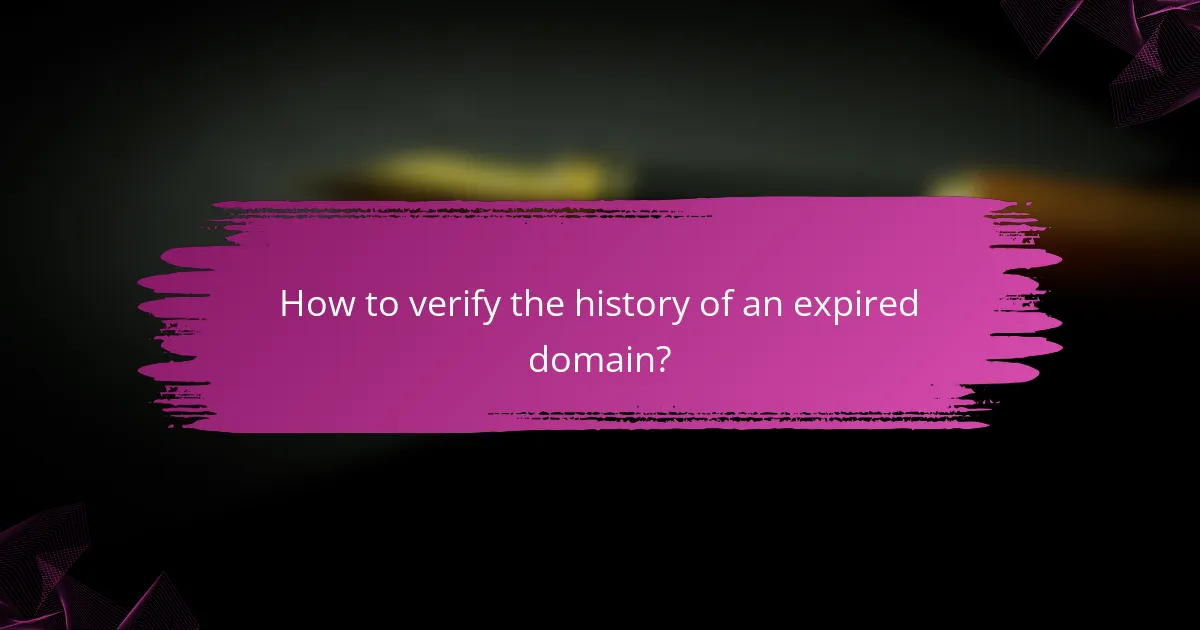
How to verify the history of an expired domain?
To verify the history of an expired domain, you should examine its past usage, ownership, and backlinks. This process helps ensure that the domain does not have a negative history that could affect your future use.
Using Wayback Machine for historical data
The Wayback Machine is a digital archive that allows you to view past versions of websites. By entering the expired domain into the Wayback Machine, you can see how the site looked at various points in time, which can reveal its content and purpose.
Look for any significant changes in content or ownership over time. If the domain was previously associated with spammy or harmful content, it might pose risks to your current projects.
Checking domain registration records
Domain registration records provide information about the domain’s ownership history and registration details. You can access this data through WHOIS lookup services, which can show you when the domain was registered and when it expired.
Pay attention to the previous owners and any changes in registration details. Frequent changes in ownership or a short registration period may indicate potential issues with the domain.
Assessing backlinks and previous ownership
Analyzing backlinks is crucial as they can significantly impact your domain’s SEO. Use tools like Ahrefs or Moz to check the quality and quantity of backlinks pointing to the expired domain.
Look for backlinks from reputable sites, as these can enhance your domain’s authority. Conversely, if the domain has many low-quality or spammy backlinks, it could harm your search engine rankings and reputation.
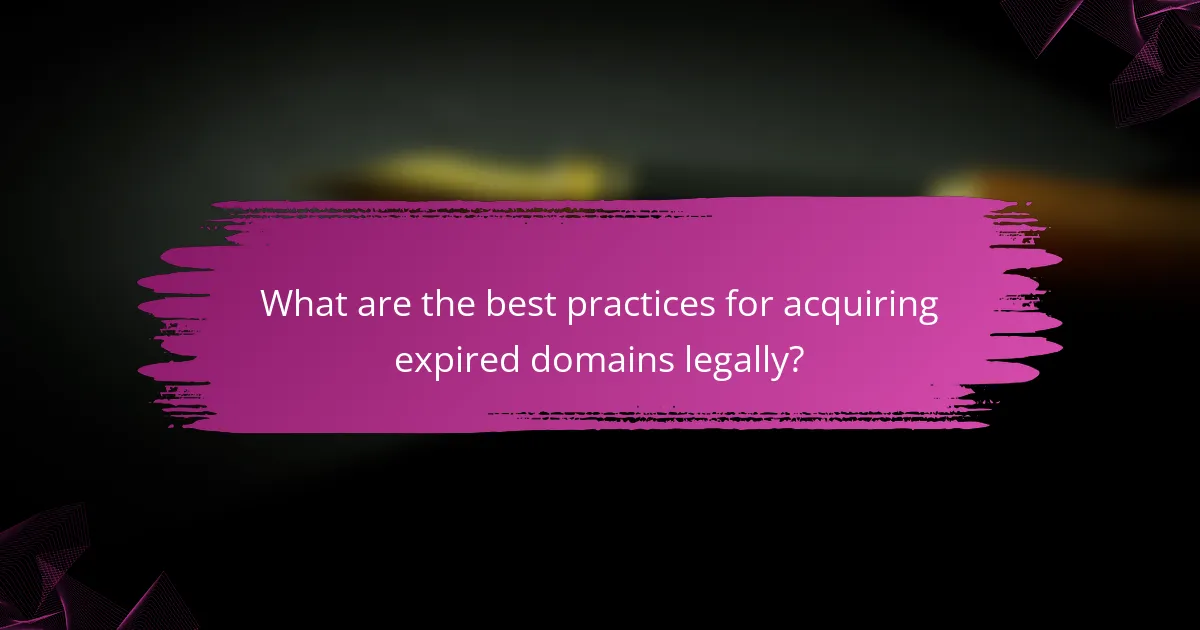
What are the best practices for acquiring expired domains legally?
To acquire expired domains legally, it’s essential to follow specific best practices that ensure compliance with laws and regulations. This includes conducting thorough research, consulting legal experts, and understanding the local legal framework in South Africa.
Conducting thorough due diligence
Due diligence involves researching the history and previous ownership of the expired domain. Check for any past penalties, trademark issues, or associations with spammy practices that could affect your future use of the domain.
Utilize tools that provide domain history, such as WHOIS databases and archive services, to gather comprehensive information. This step can save you from potential legal troubles and help you make an informed decision.
Consulting with a legal professional
Engaging a legal professional with expertise in intellectual property and internet law is crucial when acquiring expired domains. They can help you navigate complex legal issues, including trademark rights and potential liabilities.
A lawyer can also assist in drafting agreements or contracts related to the purchase, ensuring that your interests are protected and that the transaction complies with South African law.
Ensuring compliance with South African laws
In South Africa, it is vital to comply with the Electronic Communications and Transactions Act, which governs online transactions and domain registrations. Familiarize yourself with the regulations surrounding domain ownership and transfer to avoid legal complications.
Additionally, be aware of the South African Domain Name Authority’s policies, as they may have specific requirements for registering and transferring expired domains. Ignoring these regulations can lead to disputes or loss of the domain.
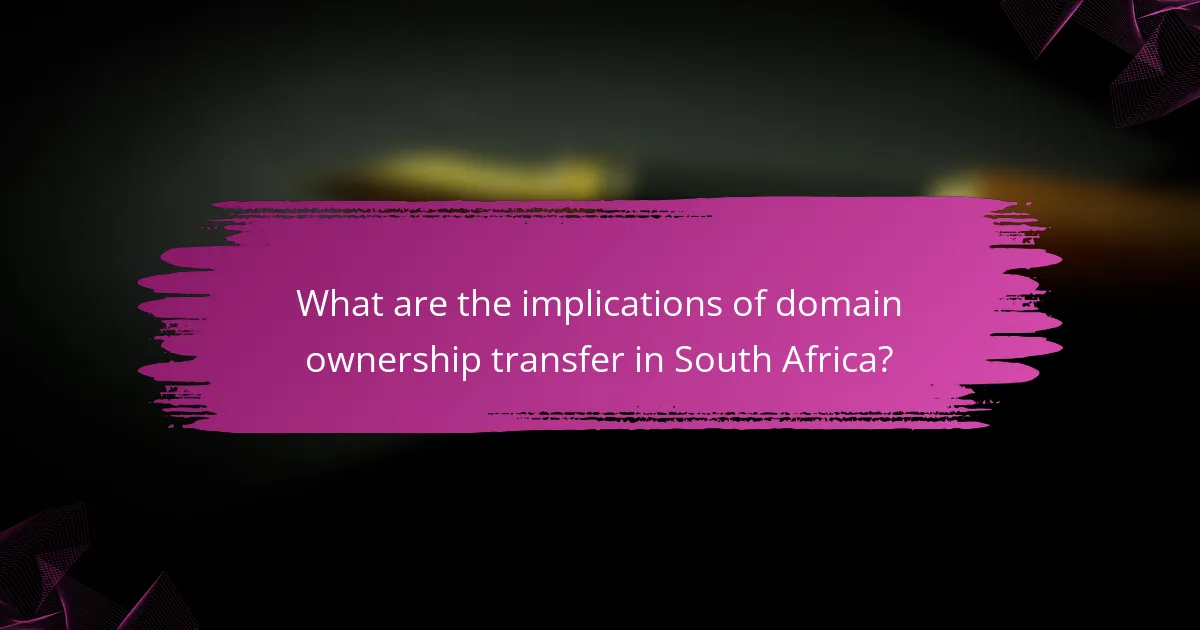
What are the implications of domain ownership transfer in South Africa?
The implications of domain ownership transfer in South Africa involve understanding the legal requirements and potential liabilities associated with acquiring an expired domain. Buyers must ensure that the domain is free of any encumbrances and that the transfer process complies with local regulations.
Understanding the transfer process
The transfer process for domain ownership in South Africa typically requires the current owner to initiate the transfer through their registrar. The new owner must provide their details to the registrar, who will then update the domain’s registration information. This process can take anywhere from a few hours to several days, depending on the registrar’s policies.
It is crucial to verify that the domain is not subject to any disputes or legal issues before proceeding with the transfer. Conducting a thorough background check on the domain can help avoid complications later on.
Registering the domain with a local registrar
Once the transfer is complete, the new owner should register the domain with a local registrar to ensure compliance with South African regulations. Local registrars are familiar with the specific requirements and can provide guidance throughout the registration process. This step is essential for maintaining ownership and avoiding potential legal issues.
Choosing a reputable registrar is important. Look for registrars that are accredited by the South African Domain Name Authority (ZADNA) to ensure that your registration is secure and legitimate.
Tax implications of domain acquisition
Acquiring a domain in South Africa may have tax implications, particularly if the domain is used for business purposes. The purchase price of the domain could be considered a business expense, which may be deductible for tax purposes. However, it is advisable to consult with a tax professional to understand the specific implications based on your situation.
Additionally, if the domain is sold in the future for a profit, capital gains tax may apply. Keeping accurate records of the purchase and sale prices will be essential for tax reporting and compliance.
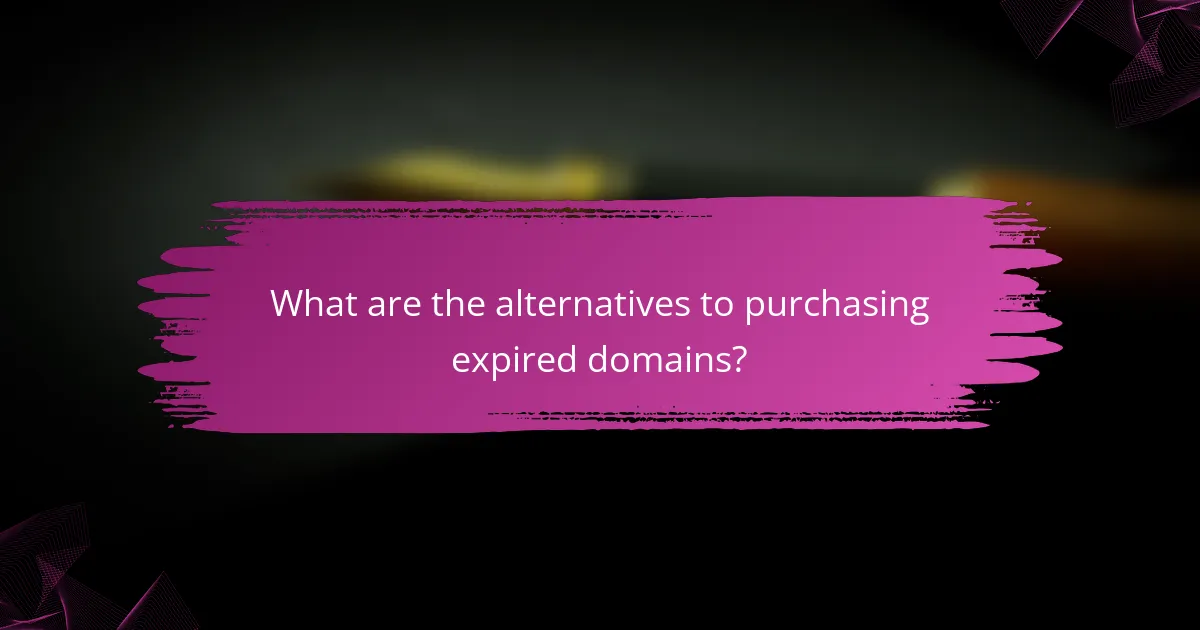
What are the alternatives to purchasing expired domains?
Alternatives to purchasing expired domains include buying new domains with similar keywords, utilizing domain auction platforms, and exploring domain leasing options. Each of these strategies can help you secure a domain that meets your needs without the potential legal complications associated with expired domains.
Buying new domains with similar keywords
Purchasing new domains that incorporate similar keywords can be an effective strategy. This approach allows you to create a unique brand identity while still targeting relevant search terms. Aim for domain names that are concise, memorable, and closely aligned with your business focus.
Consider using tools like Google Keyword Planner or other SEO resources to identify popular keywords in your niche. This can help you select a domain that not only resonates with your audience but also improves your search engine visibility.
Utilizing domain auction platforms
Domain auction platforms provide a marketplace for buying and selling domains, including those that may not be expired but are still valuable. Websites like GoDaddy Auctions or Sedo allow you to bid on domains that fit your criteria. Be prepared to set a budget, as popular domains can attract competitive bids.
When using auction platforms, research the domain’s history and traffic metrics to assess its potential value. Look for domains that have existing backlinks or traffic, as these can give you a head start in building your online presence.
Exploring domain leasing options
Domain leasing is an alternative that allows you to use a domain without outright purchasing it. This can be a cost-effective solution, especially for startups or businesses looking to test a market. Leasing agreements typically involve monthly payments and can last for a specified term.
When considering leasing, ensure that the terms are clear, including renewal options and any restrictions on usage. This can help you avoid misunderstandings and ensure that the domain aligns with your long-term business goals.
